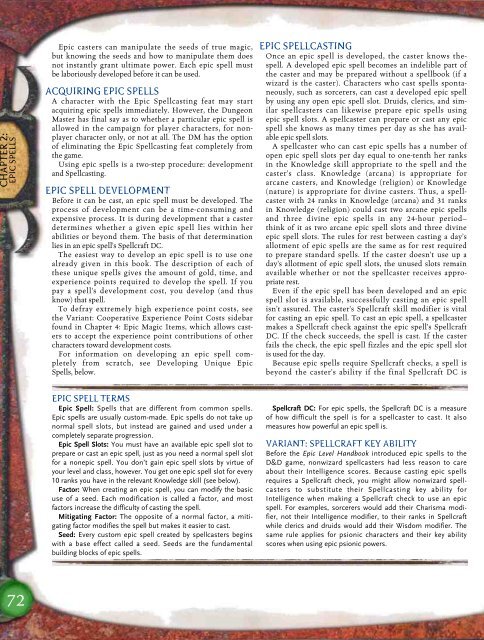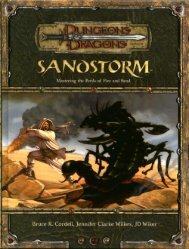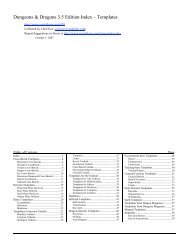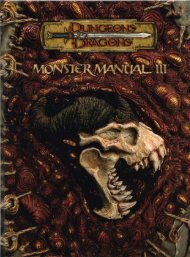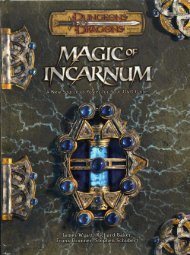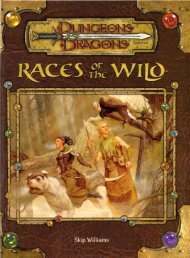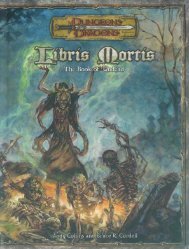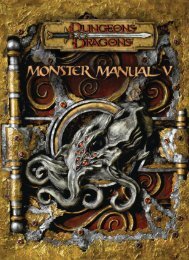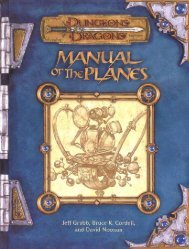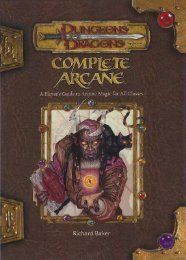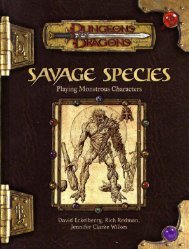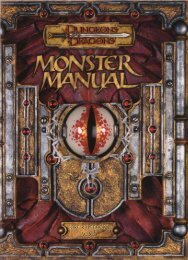Epic Level Handbook
Epic Level Handbook
Epic Level Handbook
- No tags were found...
Create successful ePaper yourself
Turn your PDF publications into a flip-book with our unique Google optimized e-Paper software.
CHAPTER 2:EPIC SPELLS<strong>Epic</strong> casters can manipulate the seeds of true magic,but knowing the seeds and how to manipulate them doesnot instantly grant ultimate power. Each epic spell mustbe laboriously developed before it can be used.ACQUIRING EPIC SPELLSA character with the <strong>Epic</strong> Spellcasting feat may startacquiring epic spells immediately. However, the DungeonMaster has final say as to whether a particular epic spell isallowed in the campaign for player characters, for nonplayercharacter only, or not at all. The DM has the optionof eliminating the <strong>Epic</strong> Spellcasting feat completely fromthe game.Using epic spells is a two-step procedure: developmentand Spellcasting.EPIC SPELL DEVELOPMENTBefore it can be cast, an epic spell must be developed. Theprocess of development can be a time-consuming andexpensive process. It is during development that a casterdetermines whether a given epic spell lies within herabilities or beyond them. The basis of that determinationlies in an epic spell’s Spellcraft DC.The easiest way to develop an epic spell is to use onealready given in this book. The description of each ofthese unique spells gives the amount of gold, time, andexperience points required to develop the spell. If youpay a spell’s development cost, you develop (and thusknow) that spell.To defray extremely high experience point costs, seethe Variant: Cooperative Experience Point Costs sidebarfound in Chapter 4: <strong>Epic</strong> Magic Items, which allows castersto accept the experience point contributions of othercharacters toward development costs.For information on developing an epic spell completelyfrom scratch, see Developing Unique <strong>Epic</strong>Spells, below.EPIC SPELLCASTINGOnce an epic spell is developed, the caster knows thespell.A developed epic spell becomes an indelible part ofthe caster and may be prepared without a spellbook (if awizard is the caster). Characters who cast spells spontaneously,such as sorcerers, can cast a developed epic spellby using any open epic spell slot. Druids, clerics, and similarspellcasters can likewise prepare epic spells usingepic spell slots. A spellcaster can prepare or cast any epicspell she knows as many times per day as she has availableepic spell slots.A spellcaster who can cast epic spells has a number ofopen epic spell slots per day equal to one-tenth her ranksin the Knowledge skill appropriate to the spell and thecaster’s class. Knowledge (arcana) is appropriate forarcane casters, and Knowledge (religion) or Knowledge(nature) is appropriate for divine casters. Thus, a spellcasterwith 24 ranks in Knowledge (arcana) and 31 ranksin Knowledge (religion) could cast two arcane epic spellsand three divine epic spells in any 24-hour period–think of it as two arcane epic spell slots and three divineepic spell slots. The rules for rest between casting a day’sallotment of epic spells are the same as for rest requiredto prepare standard spells. If the caster doesn’t use up aday’s allotment of epic spell slots, the unused slots remainavailable whether or not the spellcaster receives appropriaterest.Even if the epic spell has been developed and an epicspell slot is available, successfully casting an epic spellisn’t assured. The caster’s Spellcraft skill modifier is vitalfor casting an epic spell. To cast an epic spell, a spellcastermakes a Spellcraft check against the epic spell’s SpellcraftDC. If the check succeeds, the spell is cast. If the casterfails the check, the epic spell fizzles and the epic spell slotis used for the day.Because epic spells require Spellcraft checks, a spell isbeyond the caster’s ability if the final Spellcraft DC isEPIC SPELL TERMS<strong>Epic</strong> Spell: Spells that are different from common spells.<strong>Epic</strong> spells are usually custom-made. <strong>Epic</strong> spells do not take upnormal spell slots, but instead are gained and used under acompletely separate progression.<strong>Epic</strong> Spell Slots: You must have an available epic spell slot toprepare or cast an epic spell, just as you need a normal spell slotfor a nonepic spell. You don’t gain epic spell slots by virtue ofyour level and class, however. You get one epic spell slot for every10 ranks you have in the relevant Knowledge skill (see below).Factor: When creating an epic spell, you can modify the basicuse of a seed. Each modification is called a factor, and mostfactors increase the difficulty of casting the spell.Mitigating Factor: The opposite of a normal factor, a mitigatingfactor modifies the spell but makes it easier to cast.Seed: Every custom epic spell created by spellcasters beginswith a base effect called a seed. Seeds are the fundamentalbuilding blocks of epic spells.Spellcraft DC: For epic spells, the Spellcraft DC is a measureof how difficult the spell is for a spellcaster to cast. It alsomeasures how powerful an epic spell is.VARIANT: SPELLCRAFT KEY ABILITYBefore the <strong>Epic</strong> <strong>Level</strong> <strong>Handbook</strong> introduced epic spells to theD&D game, nonwizard spellcasters had less reason to careabout their Intelligence scores. Because casting epic spellsrequires a Spellcraft check, you might allow nonwizard spellcastersto substitute their Spellcasting key ability forIntelligence when making a Spellcraft check to use an epicspell. For examples, sorcerers would add their Charisma modifier,not their Intelligence modifier, to their ranks in Spellcraftwhile clerics and druids would add their Wisdom modifier. Thesame rule applies for psionic characters and their key abilityscores when using epic psionic powers.72


